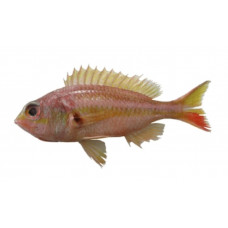Latin name
Parascolopsis capitinis
Other name
Parascolopsis capitinis
Identification
Large-headed seabreams have a moderately deep body, with a standard length of 2.7-3 times their depth.
Features of fish fins
These fish have a continuous incised dorsal fin supported by 10 spines and 9 soft rays. The anal fin is supported by 3 spines and 7 soft rays. The pectoral fins are long and reach to or near the anus, while the pelvic fins are also long and reach to the respiratory tract.
Fish colouring
The body colour is dark pink, the upper body darker than the lower, with a broad horizontal yellow stripe down the middle of the sides. There is a dark elongated spot near the front end of the lateral line. The dorsal fin is light red with a redder border in the spiny area, the pectoral fins are pink with black at the upper base, the pelvic and anal fins are translucent yellow and the caudal fin is pink, sometimes with a yellow tinge.
Distribution
Occupies the western Indian Ocean off Sri Lanka and southern India.
Habitat
Tropical marine bottom dwellers.
Size
This fish reaches a standard length of 26 centimetres (10 inches), although a length of 20 centimetres (7.9 inches) is more typical.
Behavior
The Large-head threadfin bream is a non-migratory species.
Food and feeding habits
Large-head threadfin bream prey on fish, crustaceans, cephalopods and polychaetes.
Reproduction
There is an obvious sexual dimorphism in size: males are larger, females smaller. They may be protogynous hermaphrodites or males may grow faster than females. They spawn throughout the year with one or two periods of maximum breeding activity.
Fishing
This species is commercially important for fishing.
Relationship with a person
Harmless.
| Classification | |
| Phylum | Chordata |
| Class | Actinopterygii |
| Squad | Acanthuriformes |
| Family | Nemipteridae |
| Genus | Parascolopsis |
| Species | P. capitinis |
| Features | |
| Conservation status | Least Concern |
| Habitat | Bottom |
| Life span, years | No information |
| Maximum body weight, kg | No information |
| Maximum length, cm | 26 |
| Sailing speed, m/s | No information |
| Threat to people | Edible |
| Way of eating | Predator |

